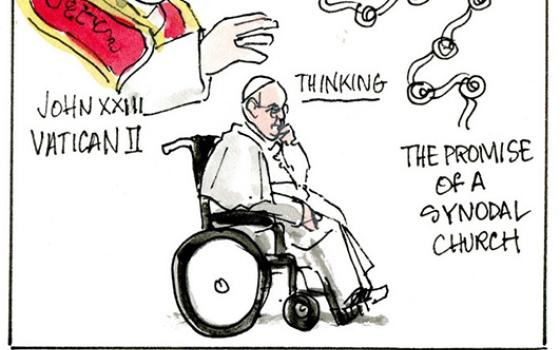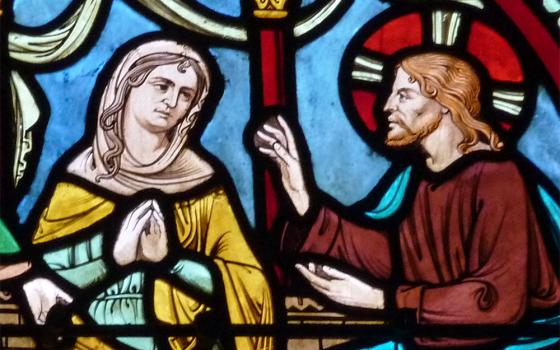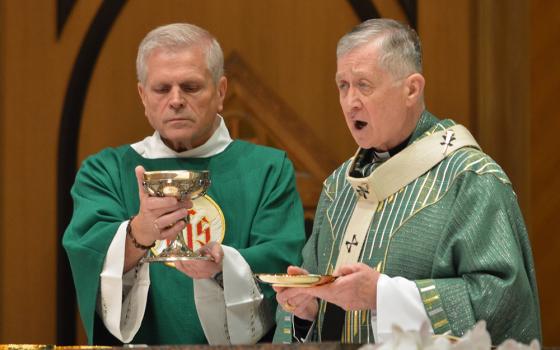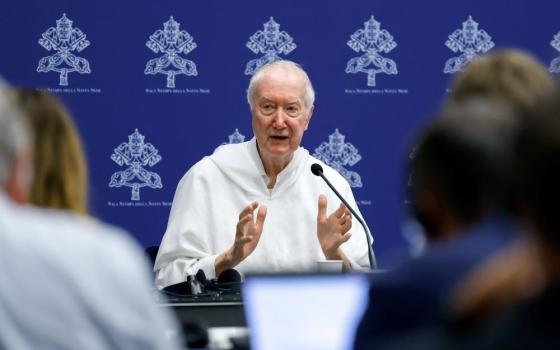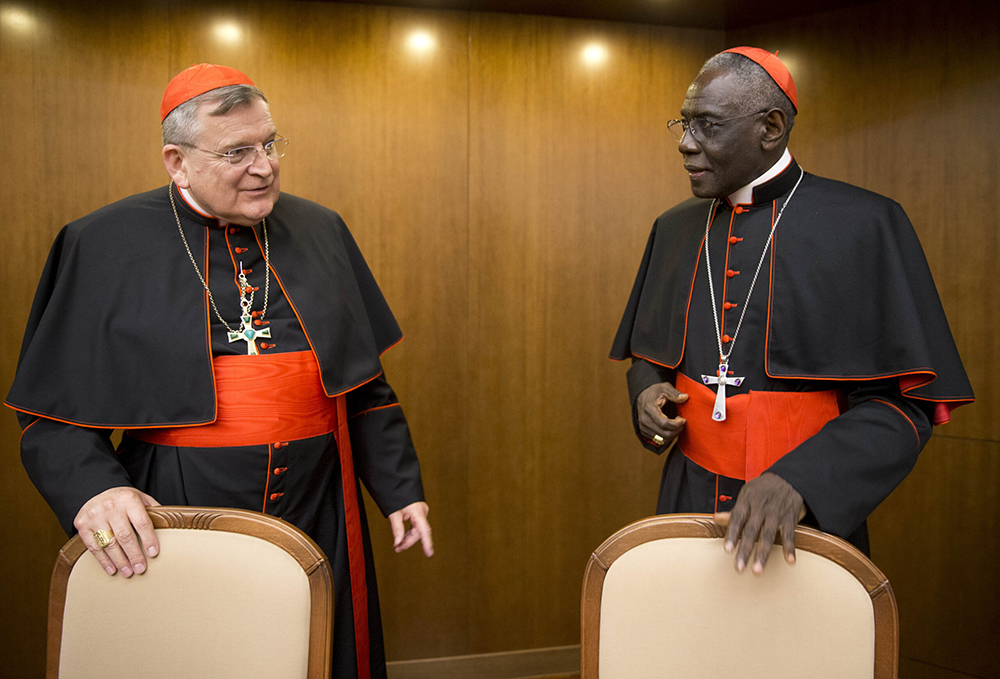
Cardinal Raymond Leo Burke, left, talks with Cardinal Robert Sarah in Rome, Oct. 14, 2015. (AP/Andrew Medichini, File)
Catholic conservatives love to wrap themselves in the "traditional" teachings of the church, but in actuality their idea of tradition is what they learned as children in grammar school. Any change is considered heresy.
These so-called traditionalists are creatures of the Counter-Reformation, still living in a church traumatized by the dissolution of a single Western church in the 16th century, which made it of first importance to distinguish how Catholics are different from Protestants and where disagreements are suppressed.
This Counter-Reformation attitude dominated the church up to the Second Vatican Council (1962-1965), which opened the church to ecumenism and a richer view of tradition. But Pope Francis, the first truly post-Counter-Reformation pope since Vatican II's instigator, Pope John XXIII, has become the target of traditionalist ire.
This is in part because Francis is not afraid of open discussion; he is pastoral rather than dogmatic in his approach to people; he focuses on areas of agreement rather than disagreements. He will not let today's Pharisees — conservative theologians and canon lawyers — get in the way of pastoral concern for real people.
All of this was on display when five cardinals, all retired, addressed five questions or "dubia" to Francis about the Synod on Synodality going on this month in Rome. The five, who included U.S. Cardinal Raymond Burke, addressed issues such as the blessing of same-sex couples, sacramental absolution, women's ordination and the authority of the synod.
Earlier, some of the cardinals, plus some bishops, had raised similar questions, and Francis had answered in private correspondence. The questioners, reflecting their Counter-Reformation mindset, wanted "yes" or "no" answers to their questions, in the custom of dubia. Instead, Francis responded at length because the issues are complex. Unsatisfied, the five cardinals released a reworded version of their questions.
Advertisement
But as I reviewed the cardinals' dubia, I began to imagine other questions that could address other changes in Catholic teaching throughout the history of the church. I decided to have some fun and draw up my own dubia. Let's pretend that I found them in the Vatican archives.
My six dubia focus on our modern habit of calling priests "father," on the observance of the Jewish law by gentile Christians, the use of statues in churches, the just-war theory, charging interest on loans and closing Limbo.
First dubia: Father
Is not calling priests "Father" contrary to the direct command of Christ?
Jesus could not have been clearer: "Call no one on earth your father; you have but one Father in heaven" (Matthew 23). Calling priests "Father" is a violation of the explicit command of Jesus.
Second dubia: Observance of the Jewish law
Should not the gentile Christians follow all the Jewish traditions and laws?
Jesus and the Apostles were observant Jews. Paul was a heretic who misled the church.
Jesus clearly taught:
Do not think that I have come to abolish the law or the prophets. I have come not to abolish but to fulfill. Amen, I say to you, until heaven and earth pass away, not the smallest letter or the smallest part of a letter will pass from the law, until all things have taken place. Therefore, whoever breaks one of the least of these commandments and teaches others to do so will be called least in the kingdom of heaven. But whoever obeys and teaches these commandments will be called greatest in the kingdom of heaven.
We should not give in to human weakness. Christians are supposed to follow the law. Those who say disagree are least in the kingdom of heaven.
Third dubia: Idols in churches
Is it not against the teachings of Scripture to have idols or statues in churches?
Jesus and the Apostles were good Jews and would be scandalized if they walked into a Baroque church today. This is an example of Christians abandoning their tradition to adapt to European culture. This practice shows how inculturation can undermine the true faith.
Scripture is clear on the evil of idols. Exodus 20: "You shall not make for yourself an idol or a likeness of anything in the heavens above or on the earth below or in the waters beneath the earth." The First Letter of John reads: "Children, be on your guard against idols." Paul, in his Letter to the Corinthians, is succinct: "my beloved, avoid idolatry."
Statues in churches must be destroyed.
Anyone who thinks a simple "yes" or "no" would suffice as an answer to these dubia or the ones posed by the cardinals needs a better understanding of history and the complexity of Catholic theology.
Fourth dubia: Just war
Is not the just war theory against the teaching and practice of Jesus?
Jesus was all-powerful but nonviolent. He was clearly a pacifist. He told his followers not to fight back but to turn the other cheek. Augustine, a so-called saint, led the people into error by inventing the just-war theory. This was clearly an attempt to curry favor with the political elites of his time. Military service is a sin.
Fifth dubia: Interest on loans
Is not the charging of interest on loans against the Scriptures?
Scripture is clear: God-fearing people do not charge interest on loans. The Book of Exodus' 22nd chapter says, "If you lend money to my people, the poor among you, you must not be like a money lender; you must not demand interest from them."
Legitimizing the charging of interest is another example of weakening the true faith to adapt to European culture. This is giving in to capitalism and bankers. Jesus and the early church would never permit the charging of interest. In the Acts of the Apostles, "The community of believers was of one heart and mind, and no one claimed that any of his possessions was his own, but they had everything in common." Communism is the only way.
It is a sin to work for a bank or have a bank account that earns interest.
Sixth dubia: Limbo
Was not the traditional teaching of the church violated by the abandoning of Limbo by the Apostate Benedict (the last true pope was Pius IX)?
The Baltimore Catechism is clear: "Persons, such as infants, who have not committed actual sin and who, through no fault of theirs, die without baptism, cannot enter heaven; but it is the common belief they will go to some place similar to Limbo, where they will be free from suffering, though deprived of the happiness of heaven."
The Apostate Benedict, who pretended to be a conservative, showed his true colors by abandoning Limbo. He clearly placed "pastoral sensitivity" over doctrinal rigor. Shame on him. Put the children back in Limbo.
Although my dubia are presented with tongue in cheek, they and others could have been written at various times in the history of the church when it was experiencing dissension and change. In each case, the current practice of the church appears to be in direct contravention of Scripture or the tradition of the church.
Hundreds if not thousands of books have been written on each of these topics defending a change in church teaching. Anyone who thinks a simple "yes" or "no" would suffice as an answer to these dubia or the ones posed by the cardinals needs a better understanding of history and the complexity of Catholic theology.





